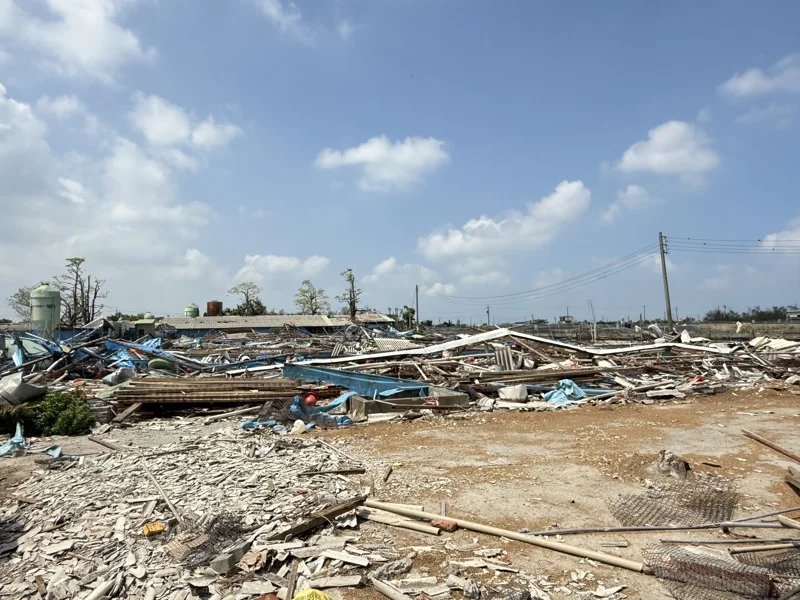CHIAYI COUNTY, July 19, 2025 — Central and Southern Taiwan are reeling from the powerful winds brought by the recent typhoon, with traditional chicken farms among the hardest hit. In Yizhu Township, Chiayi County alone, 12 out of 20 chicken coops collapsed, leaving behind hazardous asbestos debris and millions in cleanup costs.
Many of the region’s chicken farms still use outdated structures, with roofing made from asbestos tiles — a material now known to pose serious health risks. As the storm tore through the area, tons of broken asbestos, canvas, and steel pipes were scattered across the properties. Chicken farmer Mr. Lin, who has raised poultry in the area for nearly 40 years, called it the worst disaster he has ever experienced.
“From age 28 to 66, I’ve never seen damage this severe,” Lin said. On the day of the storm, he was at the farm when the wind began to tear apart the canvas roofing and send steel pipes flying. He quickly shut off the power and evacuated. “The damage was beyond repair. I have no choice but to tear everything down and start from scratch.”
Lin estimates it will take at least six months to rebuild. During that time, he’ll have to raise new chicks — meaning no income for the foreseeable future.
Despite the devastation, Lin emphasized his commitment to his staff: “Not a single employee was laid off after the storm.” Instead, he asked them to help with cleanup efforts, sorting through debris like wood and plastic as they wait for licensed removal contractors. But the biggest burden lies in the asbestos tiles, which cost NT$45,000 per ton to dispose of. Lin estimates he will need over NT$2 million just to remove the hazardous material.
Experts are warning of the long-term health risks if asbestos isn’t removed properly. Lin Pei-ru, Director of the Chiayi County Livestock Disease Control Center, explained that many older chicken coops still have asbestos roofs, which were ripped apart by the typhoon. Improper disposal can release dangerous carcinogenic fibers into the air.
Lin’s team is also working to prevent an outbreak of avian influenza by conducting widespread disinfection of affected areas. Authorities are urging farmers not to dispose of asbestos in regular garbage trucks but to hire certified waste removal services.
Zhang Huichuan, head of Chiayi’s Environmental Protection Bureau, said the Ministry of Environment is planning a subsidy program for asbestos removal, which will apply regardless of whether the damage was typhoon-related. Farmers can begin the removal process immediately and apply for reimbursement once the policy is finalized.
Meanwhile, Shi Huiling, Director of the Department of Agriculture’s Animal Husbandry Conservation Section, confirmed that affected farms have been instructed to securely bag the asbestos tiles while waiting for official guidance on disposal procedures and financial aid.
As the cleanup begins, farmers like Mr. Lin are left hoping for swift government support to rebuild their livelihoods — safely and sustainably.



